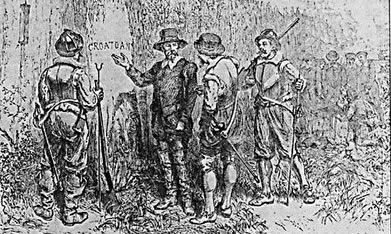The Lost Colony
North Carolina was first settled in 1587. 121 settlers led by John White landed on present-day Roanoke Island on July 22, 1587. It was the first English settlement in the New World. On August 18, 1587, White’s daughter gave birth to Virginia Dare, the first English child born in the New World. By 1590, however, all of the colonists on the island had disappeared. To this day, no one knows what happened to them, though some believe they integrated with and were absorbed by one of the local tribes. Today, the colony is referred to as "The Lost Colony".
 |
| The Baptism of Virginia Dare |
Nathaniel Batts
The first permanent English settlement in North Carolina occurred in 1655 when Nathaniel Batts, a Virginia farmer, migrated to an area just south of Virginia with the hopes of finding suitable farmland.
Lords Proprietors
In 1663, King Charles II awarded eight noblemen called the Lord Proprietors the Province of Carolina (named after the King) in appreciation of their efforts in helping him regain the throne of England. At the time, the Province of Carolina included both present-day North and South Carolina.
Carolina Splits
In 1665, Sir John Yeamans established a second permanent colony in North Carolina on the Cape Fear River near present-day Wilmington. In 1670, a settlement near present-day Charleston, South Carolina (Charles Town) was established. This settlement grew quickly because it had a natural harbor and allowed easy access to trade with the West Indies. Charles Town soon became the principal seat of government for the entire region. Because of the distance between Charles Town and points in the northern part of the colony, the terms "North Carolina" and "South Carolina" came into use. In 1729, the Lord Proprietors sold their interests in the Carolina colony back to the English Crown, and North and South Carolina became separate royal colonies.
North Carolina Colony Articles and Activities
13 Colonies Navigation
Other 13 Colonies Articles



